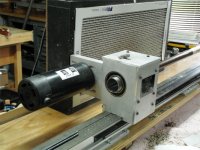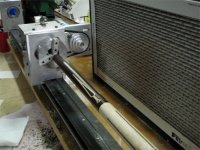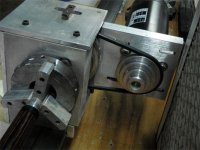I just read this thread as I have been out of town for a few days. Got stuck in a HUGE snow storm in Virginia. No power for almost three days. Well it is the same old thing over and over here. Lee posts a very fair price for his mount and someone points out that they can make it for pennies. But the thing that really amuses me is that Dick says he has never used one of the smaller lathes, but then says "portability and a quick start up in cue construction are about the only things that the smaller outfits have over the large stuff." We have had our rounds on here because he said my lathes could not do this or that and were not real lathes and so on. So I went and made my lathes do threading, just because I got tired of hearing Dick say over and over they can't thread. I would be interested in hearing what Willee thinks the large lathe does easier or better than the small lathe and hear what he thinks the stripped down Deluxe does easier or better than the large lathe, since he only has a stripped down Deluxe.
I am not trying to start another long drug out feud with Dick, but I am curious why he feels the need to knock the smaller lathes over and over, especially after saying he had never used one. Here are some of my thoughts. He says get a mill and a lathe and you can build everything else. He makes it sound like you don't need anything else to make all the parts. How would I make an indexing fixture with just a lathe and mill in my shop? No cheating here. You would most likely wind up buying a indexer to build your indexer with. Or you want to make steady rests or other tooling to mount on the lathe bed. You have to machine angles there instead of slots so more expensive tooling to buy. So in reality you have to invest in a lot of tooling to make the mill and lathe build all the metal parts needed to modify them for cue work. Here are some advantages to the small machines that are often overlooked. Ease of going from one operation to another is often faster IMO with the smaller lathe. Not having to put another indexing head on for using the power feed to cut points and slot rings is another. Being able to use the head to cut full splice handles on the band saw. Instant reverse of the power feed. Ease of holding short tapered objects true. Another thing the smaller lathe actually does is eliminate several extra fixtures. In turn that also saves shop space. This is especially easier with multiple cross slides. But I asked what Willee thought since he mentioned it, so I will quit venting.
Let me start buy asking you just how easy is it to make this adapter that is being referred to on your equipment? Just how many other appliances or fixtures can be made on your equipment? Using the lathe or mill to make many of the jigs or fixtures needed to make cues at a very low cost is what was being discussed. How did you jump from a discussion by me of making jigs to you coming to the conclusion that I am knocking your equipment on it's ability to make cues? You sound like Sarah Palin. But since you have opened it up let's do discuss the differences.
"But the thing that really amuses me is that Dick says he has never used one of the smaller lathes,"
No, I didn't say that. I have used one of your lathes once to put on some tips and polishes and I have used a Unique a number of times, just not to build cues.
"We have had our rounds on here because he said my lathes could not do this or that and were not real lathes and so on. So I went and made my lathes do threading, just because I got tired of hearing Dick say over and over they can't thread."
Actually I believe I said that in one thread only, but I could be wrong. Just how much does this little option cost? I believe it is standard on most larger lathes. Will this threader make odd size metal pins for driving shafts?
"He says get a mill and a lathe and you can build everything else."
Once again, would you mind showing where I said this?
"You would most likely wind up buying a indexer to build your indexer with. Or you want to make steady rests or other tooling to mount on the lathe bed. You have to machine angles there instead of slots so more expensive tooling to buy. So in reality you have to invest in a lot of tooling to make the mill and lathe build all the metal parts needed to modify them for cue work."
Yes, you need some cutters and an indexer. You don't need any cutters on your equipment? How nice.
"Ease of going from one operation to another is often faster IMO with the smaller lathe."
Oh really. I think you would find it much, much quicker for most operations on larger equipment. The last time you said this you gave mounting a steady rest as being so much quicker on your equipment so I timed it in my lathe. Took it off it's hook, mounted it on the lathe and installed a collet and the turning dowel - 25 seconds. Just how much time will I save using yours?
Your machine is smaller but it still takes up a foot print not a whole lot smaller than a larger lathe unless you fold it up and put it away when your done. You say the bigger machines need so much expensive tooling. Just what is this expensive tooling that is needed and what is needed is usually pays for itself with it's first use. I've got some indexers that cost between 30 and 40.00 set up on jigs. I've got cutting tools for my lathe which are the same price as the ones for yours. I've got cutting tools and hold down clamps for my mini-mill. Big deal.
When's the last time you built a full length tapering set-up on your lathe for less than 15.00? Can your equipment build saw shaft machines or full size CNCs? Just what else can your equipment do besides make cues? How long does your equipment last with out maintenance work needed? Just how much needs to be invested for your cue making lathe with the options that are needed to build the cue such as threaders and taper attachments and so on and so on. I would say a whole lot more than a lathe, mill/drill and all the tooling needed.
What started this thread was a man complaining about the cost of a bracket to go on your lathe as he thought it was overpriced. I tried to explain why something as simple as that, cost what it does when having to be made one at a time compared to mass produced and then explained how it could be cheaply made with larger equipment by ones self in spare time. Sorry to hurt your feelings but by having the larger equipment does have benefits other than just the capability to turn wood. Nothing was said about which system did a better job at cue making. In fact in the follow up post to Willlee this was addressed. You are just so quick to defend your cash cow that apparently you didn't take the time to read the post. No worry. You've got plenty of disciples using and loving your system and they will keep on purchasing all of your add ons trying to accomplish what is standard on larger equipment.
Dick


